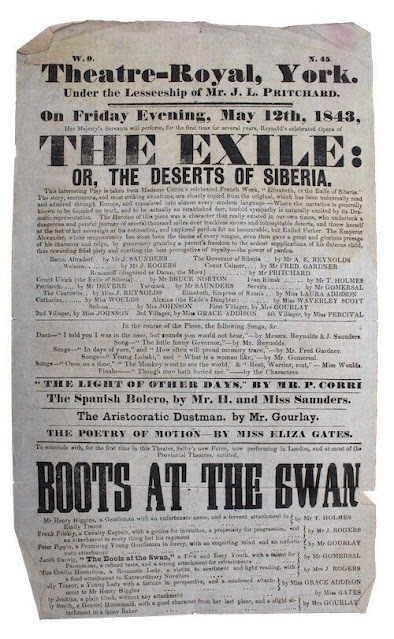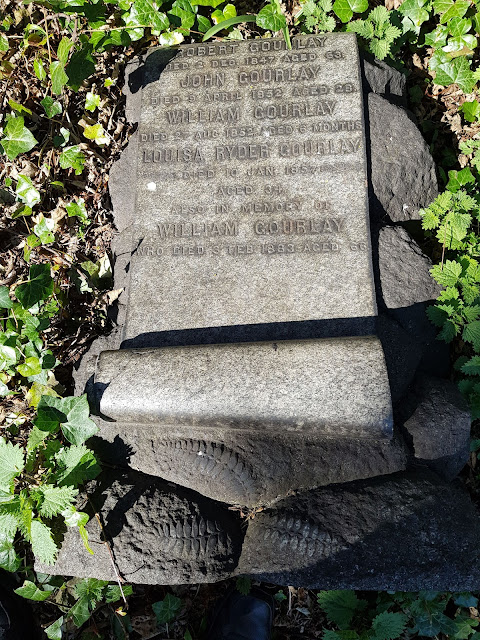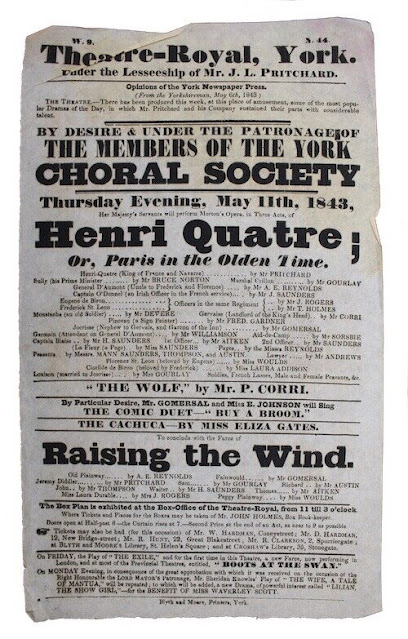Another splendid ebay find ...
The Theatre Royal, York. 1843. OK fair bit of research to do here although there are a number of names there I recognise.One of them is that of Frederick Gardner, who Mr Pritchard clearly thought was his star card. Well, I suppose he was a tenor ...
GARDNER, Frederick (b Manchester, ?c1811; d Fostoria, Ohio 11 January 1898)
There are some artists who flash across the musical and theatrical scene, leaving little clue as to whence they came, or whither they went. When the young Mr Frederick Gardner was whisked off to New York, as the leading tenor for Mr Rophino Lacy’s vastly-puffed daughter’s operatic troupe, one could very well have said ‘who?’ But Fred actually had been a few years on the stage. Even if he wouldn’t be for very many more.
But, with a little help from my friend Betsy, and the Burlington Hawk-Eye, I’ve managed to find out who he was. He was born in Lancashire, son to a John Gardner who, in the 1841 census calls himself a ‘broker’. Fred, aged 20 (30, surely?) is a professor of music, and there is a Louisa, probably a sister, completing the family at 22 Norton Street, Liverpool.
The Hawk-Eye claims he was educated at Oxford, sang in the Westminster [Abbey] choir, sang at Victoria’s coronation, and was an operatic tenor in ‘London and many cities in Europe’. It also claims he had a degree, a doctorate, in music – from Oxford? – and, well, I think we can dismiss all that. The biography gets provably imaginary later on.
My first confirmable sighting of Fred as a performer is at the little Liver Theatre, Liverpool, mostly a home for conjurors and contortionists, and occasionally for dramatic seasons. The Liver was little advertised or reviewed, but on 15 March he sang ‘a favourite song’ at the Benefit of the Box Book Keeper, and 20 March 1839, he himself took a Benefit there, acting Walter Barnard in The Rover’s Bride, so I imagine he had played some sort of a little season there. Later that year, he seems to have got a job at the suburban London Pavilion Theatre (Whitsun Eve, Jack Sheppard) -- ‘this gentleman is a better actor than the generality of singers and will become a favourite’ ‘sang a pretty ballad ‘My Childhood’s Happy Home’ -- but by January he was back at the Liver Theatre, playing opposite Mrs Waylett, in her starring visit with a pasticcio version of Auber’s The Fairy Lake (‘This gentleman, a pupil of Mr A Lee, is rapidly progressing’).
In 1840, he was at the Theatre Royal, Leicester, and in 1841 he was taken on by the Lacy-Delcy machine, to take the second tenor parts, behind Templeton, playing Alidoro in Cinderella and Lorenzo in Fra Diavolo, at Liverpool and Manchester. The advertising assures us that he is ‘of the Theatre Royal, Bath’ and a pupil of Tom Welsh. Which doesn’t get ‘revealed’ anywhere else.
Back at Leicester, the press advised him: ‘We would advise Mr G to confine himself principally to simple ballads – they please more than such songs as ‘I love her’, which are difficult rather than pretty, and which require, for their execution, strong lungs rather than taste’. Which makes it rather sound as if he were not a robust tenor.
He played at Leeds (‘The execution of Mr Gardner is somewhat too rapid and his articulation occasionally a little indistinct’), Hereford and at Hull, where he was musical director for the plays and sang the incidental songs in As You Like It and The Merchant of Venice. And, as we see, above, at York.
In 1844, he was engaged for London’s Princess’s Theatre. He made his ‘first appearance in London’ (so was he not the F Gardner at the Pavilion?) in the role of Rodrigo in Othello alongside Allen and Madame Garcia. ‘A new tenor imported from the United States … he sings with discretion, but lacks refinement of style. The quality of his voice, however, is good…’ The United States? ‘A Mr F Gardner from New York debuted as Rodrigo; he is a tenor, very unequal and of faulty style; he has much to earn, or rather to unlearn ... Voice he has; yet there is such a thing as taste, which must be either good or bad, so the sooner he gets Yankee-land out of his head the better...’ But what is this United States?
On 2 May, the Princess’s opened The Crown Diamonds with Anna Thillon as star. Gardner was cast in the role of Don Sebastian for the two months’ run, and then announced as a member of the operatic troupe for none less than the Theatre Royal, Drury Lane.
In his term at the Lane, Gardner appeared as Ottokar in Der Freischütz, alongside Miss Delcy and King, as the French Knight in Balfe’s new The Daughter of St Mark and as Fernando in Fidelio, but at the end of the season he landed himself a promotion. To leading tenor, for the Lacys visit to America under the management of Mr Simpson of the Park Theatre.
The history of Miss Delcy’s career in America is told by me at length elsewhere. Gardner, Brough and the weak local cast hired to support the lady were virtually ignored, amid all the fuss and fights that characterised the Lacy tour of a little of America. Gardner got to sing Elvino, Max ka Rudolph, Edgardo, Fra Diavolo and Felix in the shadow of the ‘star’. One of the few American reviews I have culled allows him a nice voice, but accuses him of singing out of tune most of the time. Not one claims him as a New Yorker!
The Lacys returned to Britain, and gave a few performances of their operas in Dublin (4 May 1846) and at the Liverpool Adelphi (15 May). His hometown press referred to ‘a rich tenor’ ‘adequate to the part he had undertaken’… and as far as I can see, never referred to him again. Neither did anyone else in Britain. Miss Delcy and her career were finished, and we know what happened to her. But so, evidently, was that of her leading man. What became of him? Well, he went back to America. But he doesn’t seem to have sung much more. I spot him in 1850, a ‘professor of music’ aged 30, in Detroit. In 1851, he can be seen for a while touring with the Seguin troupe (Thaddeus, Elvino). After which he apparently turned to minstrelling.
Fred Gardner aged 51 ‘music teacher’ and ‘born England’, married to a Sarah (Sallie née Bell) from Lebanon, Ohio (31) with children Belle V, Fred Corwin and Rose E, (and Grace to follow in 1876) is living in Center Township, Henry, Iowa in 1870. He was apparently employed as a teacher at the Iowa Weslyan University. But the Hawk-Eye fills in the gap, telling us that ‘in 1851, he completed a four years’ course in medicine and surgery’ and practiced in medicine until disabled by arthritis. Yet he still called himself ‘professor of music’?
The 1880 census shows the family, with Sallie and Belle teaching music, still in Mount Pleasant, but no Fred. But he’s there somewhere. Because he goes on to be a teacher at the Ladies’ Seminary of Arcadia, Louisiana before his retirement.
In 1900, Sarah Bell Gardner (b November 1846) is living in Seneca Ohio with Fred jr and Rose. And a fifth child, Harry, born in New York in 1881. But Fred has gone. Allegedly, aged 87. I wonder how the Hawk-Eye knew that.
A rather more substantial member of the company was the bass Patrick Corri. The Corri family and their contribution to music and theatre in Britain have been written about at length, so I'll just pop in a few facts. And they show us that this season was a 'soon-to-be family' affair:
CORRI, Pat[rick Constantine] (b Scotland c 1820; d Bradford, 15 June 1876)
married Mary Jane WOULDS (b Clifton x 5 June 1821; d 1906) daughter of Jas Woulds of the Theatre Royal, Bath & Charlotte Mary née SMITH, Birmingham 2 April 1844
Three in one blow! We see them in the 1851 census in Shoreditch 3 Queens Row. Patricius Constantine sic 29, dramatic artist, b Scotland, Mary Jane 29 wife, with Haydn Woulds, Elinor Constance, William Smith, and Henry Bishop Corri, plus Elizabeth Woulds 24 actress and Louisa Woulds 23 dancer nextdoor is Charlotte Bishop (nee Woulds) prof mus, with visitor James WOULDS 61 comedian and Alicia Woulds actress & harpist 28
Pat was a stalwart of the British stage -- notably, a long time star at the Grecian ... but microsoft ate my large article and family tree ... and I'm blowed if I'm doing it all over.
I suppose we'd better start with the producer, John Langford PRITCHARD (b 1799; d Leeds 8 August 1850). I'm not researching him either, because, to my amazement he has been given an entry in the Dictionary of National Biography. It enumerates the items in his solid but unspectacular acting career, and finishes off saying that he went latterly north. That he did, and there leased the York Circuit of theatres -- Hull, York and Leeds. He seems to have satisfied his audiences well, for nine consecutive years, before, to general regret, being forced to retire by ill-health.
PS Nick Kurn went to Woking and found his death registration, in 1879. Buried in Brookwood Cemetery ...
Here he is at Leeds in 1848, with a few other old friends
Perhaps the most famous name on the bill, however, is that of Gomersal, for the family left a mark on the theatrical world from London to Yorkshire to the United States.
Grandfather Edward Alexander Gomersal (b 1788; d Portland Cresc, Leeds 19 October 1862) 'the Napoleon of Astley's' had made himself celebrated by his portrayal of the Buonaparte in The Battle of Waterloo. He had been lessee of the Garrick Theatre, and later became landlord of the Wellington Hotel, Leeds. In the 1851 census, with his third daughter and his wife in Market Place, Stockport, he describes himself as 'an old comedian'.
The Mr Gomersal on our bill is son number one (?), at the beginning of his career. [Edward] William GOMERSAL (b Stangate St, London 12 May 1817; d NYC 3 October 1863). Not to be confused with his brother William James GOMERSAL (b Stangate St, x 20 February 1828; d Claines, Worcs 19 May 1902) who had a much longer career as actor and theatre manager (Sheffield, Aberdeen, Norwich, and 22 years at Worcester) and who penned his memoirs as Anecdotes of the Stage (Worcestershire Publishing Co, 1891).
William and his wife, Maria, spent 1863-1868 in America, where Mrs became the first actress to sing La Grande-Duchesse de Gérolstein in English. Thereafter girlies with the Gomersal surname surfaced regularly, which I guess was a compliment. The real Gomersals of Yorkshire carried on ..
SAUNDERS. Three of 'em. Pretty well impossible. Well, I've sort of got two of them, maybe three. Yes, three! 'Died Manchester 30 January 1846 aged 54 years Mr William Saunders, father of Mr John and Miss Saunders of the Theatre Royal, and of Mr H Saunders of the Royal Amphitheatre ...'
John [Henry] SAUNDERS comedian. He first appears to my eyes in York in 1840 for race week. Then at the end of the year both he and Mr H Saunders are engaged in the lower parts of the bill for Mr Hooper's company at Hull. When he played Pedro (ie Buttons) in the panto he was told he would be 'a useful actor' if he didn't fidget. When they moved on to Leeds he did 'a comic dance'. Mr H Saunders did a pas de deux with a Miss Andrews. In 1842, the two Saunders gents were still at Hull, John taking good supportingroles, Henry doing his dances, with a Miss Hunt. But by Pritchard time 'Miss Saunders' (the press assured us that she was Henry's sister) arrived. She sings duet with Miss Woulds and dances with Henry ...
Back to John. He had a good provincial career: the York circuit, Sheffield, Manchester, Dublin, Brighton, more and more Sheffield, Bristol and billed as 'from the Theatre Royal, Westminster at Liverpool, Sunderland but an umpteenth return to Sheffield ended in disaster when he lost all his Streets of London props in a theatre fire. I see him at Cheltenham in 1866, and at Dewsbury in 1871 .. there he is with his family in Sheffield 'born 1821' with three children .. and I lose him. In 1881 his (second) wife Eliza Levy is a widow ...
Mr Henry SAUNDERS. I see him in 1838 at Edinburgh playing 'a sailor'. The other sailor is 'Mr Saunders'. I see him doing the Union Flag Dance in 1838 with Mrs Redford and 'his sister Miss Saunders'. 1840, its Mr J Saunders and Mr H at Hull. 1841-2 dancing on the York Circuit (with Mr J) and/or a Miss Andrews. 1841 he's Harlequin at Hull to John's Pantaloon, e tutti quanti ... 1848 at Liverpool .. 1850 principal dancer at the City of London Theatre under E F Saville. More Harlequin at the Standard, then 1853 at Dublin .. eh? scenery by? ah no .. Harlequin again 1854 .. the Strand Theatre (1855) ...
Miss SAUNDERS. Well, I thought I had found her. Miss Rose Saunders and her brother George Lemon Saunders set up as singing and dancing teachers in Sheffield. She had dance-trained in France, it was said. Then there was Miss Saunders the Yorkshire singer, launched noisily with Mrs Sunderland ... More delving required here. Where is papa William in C41?
Well, I tried.
Eliza GATES? Well, she was not the usual kind of nymphet dancer seen in theatres. I spot her as early as 1832, at the Blue Horse Inn, Spittlegate, Grantham, doing an unspecified dance on a programme with Mr and Mrs Gates. Papa and Mama? I see her dancing at Preston in 1835, Manchester in 1836 but, after her appearances on the York Circuit ('of the Theatre Royal, Edinburgh') she was picked up by London and made her appearance 'little and light of toe, but ..' at the Olympic Theatre, 4 December 1843, giving her 'Poetry in motion' and the Cracovienne she'd performed in Yorkshire. She was Columbine at Christmas ('animated, arch and joyous'), performed a duo with Flexmore at the Strand, and in September 1844 it came to an end. Married? Dead? Nobody seems to have noticed. Oh! But I do see this! Died, 7 July 1838, Mrs Gates wife of Mr Gates comedian of the Queen's Theatre [Manchester] aged 42'. More work needed.
Miss E JOHNSON seems to have had a short career round the York circuits, and is maybe one of Miss EJs who married local worthies...
J C PELHAM was undoubtedly a stage name. Mr J C Pelham was a well-known politician .. Maybe he was the Mr Pelham who got rubbished at the Windsor Theatre in 1841 ('the poor man continues to blunder throught his difficult parts with unprecedented stupidity ..'). Now, under Pritchard, he is 'J P Pelham'. He plays Robin in The Waterman (not a loved role!). Is it he singing Irish songs? Playing bits at the Surrey? Who knows.
You don't really think I'm going to attempt 'Mdlle Orelia'? She seems to have been all right for a few seasons.
I think that's enough. This article was really for Fred. I'll post it, forget it, and in a few years if the genealogical experts hav'n't sorted out stuff .. I'll have another go.
Gen Expert Gina has come up with this ... another Mrs Gates?
Addendum:
There is Fred piano-playing, Eliza Gates dancing, Pat Corri and Miss Woulds singing, the Saunders doing their pas de deux, A E Reynolds and J Saunders acting ...


















1 comment:
I added lots of records and your bio to FS. In 1850, US, he says he was born 1819.
I also contacted a person who entered Sallie and the family in 2023
Post a Comment